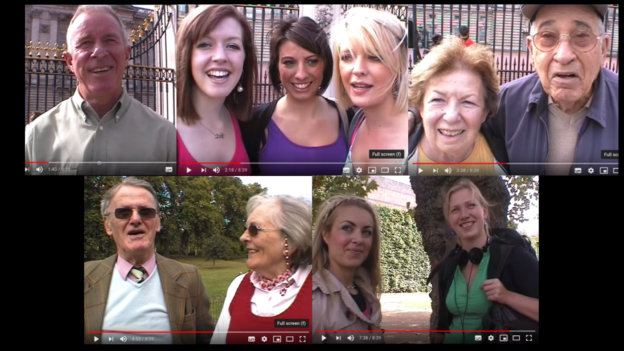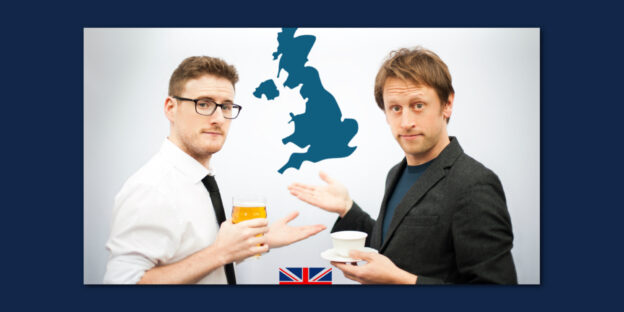Listening to the audio from another old YouTube video of mine, and then exploring it for new vocabulary and English learning opportunities.
![]() [DOWNLOAD]
[DOWNLOAD]
Transcript
Hello folks, welcome to a new episode. In this one I’m going to go through some more audio of interviews I did with native speakers of English in London 10 years ago and will mine if for any nice bits of English vocabulary that we find.
Before we begin this episode properly I just want to say a couple of things about the last episode – the one about Queen & Freddy Mercury and also to let you know about my plans for the summer and how that might affect the podcast.
We’ll start with summer plans.
Summer Plans
First of all, I’m going away on holiday during the 2nd week of July, so no podcasts will go up during that time. Then when we get back I’m teaching intensive summer courses at the British Council, which means teaching all day every day. I still have the evenings, but having a lot less time probably means I won’t be able to produce podcasts at the usual rate. So, things might go quiet for the rest of the month. Also, in August we have several holiday plans which are currently coming together and that will mean being away for at least half of the month. So things might go quiet during July and August, only to return at the normal rate in September. I’ll also prioritise premium content, because that is stuff I I feel I have a duty to publish.
Right, so that’s the summer plans and how they will affect the podcast. Things might be a bit quiet as usual at this time of year, but there’s the whole episode archive to explore, all the app-only episodes you might not have heard and all the premium content too.
Audio Quality – Queen Episode
Next let me say a couple of things about the last episode, which was all about Queen, before starting this episode properly in a few minutes.
First of all, I received some nice, enthusiastic responses from people who were very pleased that I was finally talking about Queen on the podcast.
For example, Francisca Lopez Aperador on YouTube wrote:
Hi, Luke, I was waiting for this episode. You really made my day. How could express how thrilled I am. Thanks, thanks, thanks. Cheers from Spain, teacher.
However, some people are saying that Alex is unintelligible in the Queen episode. There weren’t many comments, but I reckon if I just get one or two comments about something, it’s probably representative of what a lot of other people (ninjas) are thinking too.
For example, Arsiney wrote on the website:
I don’t understand any words in this conversation.
Luk`s speech is clear but this guy speaks like alien.
So, is Alex unintelligible? Does he speak like (an) alien?
Personally I understand every single word Alex says and said in the episode and also I noticed that YouTube’s automatic subtitles understood most of what he said (my episodes go up on YouTube now too, so you can see the automatic subtitles, which are 90% correct, going up to 95% correct when I’m on my own).
But there were definitely moments when it was difficult to understand everything he said – largely due to the audio quality during the call and partly due to Alex’s speech, and that probably made it a less satisfying listening experience for you.
Apologies for that. The audio quality wasn’t up to the normal high standard that you have become used to.
Also, Alex doesn’t enunciate as clearly as I do, but then again most people don’t.
This brings us back to this perpetual question of the way I speak on the podcast.
“Luke, do you speak normally or do you slow down because I understand everything you say but I don’t understand other native speakers.”
I do try to be normal and natural but I’m also trying to speak clearly. This is actually how I speak. I always make an effort to speak clearly. That’s who I am – partly as a result of being an English teacher, but also it’s just the way I was brought up to speak.
However, in the real world you’re going to hear people who don’t speak as clearly as me, and you need to prepare for that. I think that most people don’t speak as clearly as I do and it’s not just about speed, it’s about diction. Diction is the manner in which words are pronounced. To an extent you’ve been spoiled by my clear diction. You also have to listen to people who are harder to understand. It trains you to do things like use the context, and other words you can hear to piece together the bits you don’t understand. It’s not always going to be laid out on a plate for you, and you can’t always blame the speaker for not being clear enough for you. As I said, I always understand everything Alex says, so as far as we are concerned, he doesn’t have a problem with his speech. He goes through his life fine, communicating without issues, doing comedy on stage and making people laugh. So, Alex’s pronunciation isn’t a problem in his life. He doesn’t speak as clearly as me, but not many people do.
So, listening to someone like Alex is actually good training.
The Pros and Cons of Audio Quality & Learning English
It’s important to listen to subprime audio.
But I know that some of you will be frustrated that you couldn’t understand or hear everything, and I’m sorry about that. I thought it would be alright. I think the main thing was the audio quality actually.
Understanding what you hear is an important part of the learning process, but be careful of getting used to understanding everything. Sometimes you have to learn to fill in the gaps yourself.
I want you to understand everything you hear. Understanding what you’re hearing is an important part of the enjoyment of this podcast. It’s also an important part of how this works. I’ve talked about the role of comprehensible input. Basically, this is the theory that you learn language when you understand it, and so finding compelling material to listen to that you understand is vital.
So, naturally, clear audio is a part of that and that’s why I spend a lot of time attempting to make sure the audio is of good quality on this podcast. Where possible I even send microphones to guests I’m interviewing by Skype. I’ve sent mics to my dad, my brother, Raphael in Liverpool. I sent a mic to Andy Johnson. I couldn’t send a mic to Alex because he was using his phone, making a whatsapp call over a cellular connection. I expect this meant that the bandwidth of the audio was very narrow, or something like that. Perhaps the audio was compressed so much that there was not much range in the frequency, making it sound squashed or small. I’m not an expert in audio broadcasting so I’m not sure, but it’s probably something like that. Alex doesn’t have wifi at home – believe it or not, and so our only option was to do a voice call. No way for him to plug in a USB microphone. So, that’s one of the reasons for the difficult audio.
I’m probably going too far here and people are going to write to me saying “It’s ok Luke, don’t apologise too much!” etc. I usually go a bit over the top if I’m apologising for something on the podcast – usually because I’ve mispronounced a place name, I’ve made some factual error about your country, like saying your country is part of another country when in fact they’re separate independent nations. You know, stuff like that. Even apologising for uploading too much content. And now, apologising for less-than-perfect audio in one episode. I am probably going too far.
But it’s still worth taking this moment to talk about the pros and cons of good and bad audio, when learning English.
There are good and bad things about having super clear audio and English you can understand easily.
The pros are that you can learn a lot from it (comprehensible input) and you get the satisfaction of understanding it all.
The disadvantage is that you get used to it and then struggle to understand fast native speech.
There are also pros and cons of having audio that’s harder to understand.
Difficult audio trains you to listen more actively and intelligently.
But sometimes it’s frustrating when you don’t understand.
It’s about striking the right balance. Hopefully on my podcast I mix it up and have some audio which is not too difficult to follow, that you can learn from and enjoy, while also presenting you with more difficult things that you have to really focus on.
Now, about this episode you’re listening to right now.
This is London Native Speaker Interviews Revisited part 2.
Recently I uploaded part 1 of this series. That was episode 591.
If you remember, what I’m doing is revisiting some videos I made 10 years ago, when I went into central London with my video camera in order to do quick interviews with people about life in London. My question was “What is London really like?” I got loads of little responses from people talking about the good and bad points of life in our capital city and the videos were pretty successful. Two of them now have over a million views. Not bad.
So in these audio episodes what I’m doing is revisiting those videos. We’re going to listen to the audio from the video – see how much you can understand, and then I’m going to break it down in the usual way, clarifying bits of language and helping you to expand your vocabulary.
Also this gives me a chance to be like a film director doing my own DVD commentary track, which is always fun.
How does this relate to the topic of audio quality?
Well, I recorded these video interviews on a basic handheld camera just using the inbuilt microphone. There’s a bit of wind and loads of atmospheric noise (because central London is a very noisy place) and so yes, the audio isn’t as crystal clear as you might expect, but as I’ve said – it’s good practice. This is where we strike that balance between challenging listening and comprehensible listening.
Right, so let’s go! Let’s listen to the audio – we’ll do each mini interview one by one, and then I’ll break them down for language one by one.
We’ll listen to each clip twice. The first time I’ll just ask you the question “What are the good and bad things about living in London?”. Then listen and try to understand. Then we’ll listen again and I’ll break it all down bit by bit, and there’s quite a lot of nice, natural vocabulary to learn from this video.
On the page for this episode on the website you’ll see:
- The video
- A transcript for most of this, especially the first part
- Transcripts for each part of the video
- Vocabulary notes with definitions, for the bits of vocabulary I explain during the episode
Right, so let’s get started!
Student / Justin Bieber / Ed Sheeran
Transcript
Graphic design student: Hello
Luke: So, how long have you been in London?
Graphic design student: Two weeks
Luke: Really? What do you do?
Graphic design student: Err, graphic design. Camberwell, School of the Arts.
Luke: Ok. So, your first two weeks.
Graphic design student: First two weeks. It’s quite a big impact. Very big, lots of people, and it’s quite expensive as well.
Luke: Ok. What’s the best thing about it?
Graphic design student: Err, night life. Very good night life. It’s got, you know, erm… If you go to the right places… A lot of action, erm, you know, a lot of friendly people as well.
Luke: Excellent. What about the worst thing?
Graphic design student: Depends on where you go. I mean, there’s quite a lot of, err, muggers about, dodgy people looking at you weirdly. You want to just, turn, turn away from them
Luke: Ok yeah
Graphic design student: Apart from that, generally a lot of people are quite nice. I mean, there’s some people that shove about, but, you know, you’ve just got to deal with it.
Luke: Ok, thank you very much
Graphic design student: That’s ok
Luke: Cheers.
Vocabulary
how long have you been in London?
night life
A lot of action
Muggers
dodgy people
looking at you weirdly
Apart from that, generally a lot of people are quite nice
there’s some people that shove about
you’ve just got to deal with it.
Girl in the red scarf
Luke: So, hello
Girl in red scarf: Hello
Luke: Where are you from?
Girl in red scarf: I live in Redhill, which is about half an hour away from London
Luke: Ok, erm, how long have you lived there?
Girl in red scarf: Two weeks!
Luke: Ok. Everyone’s been living in London for two weeks for some reason. So, what’s London really like then?
Girl in red scarf: London, well, London’s a really really massive place which can be quite overwhelming, but it’s not that scary after you’ve, you know, got stuck in there. Erm, London has everything you’d ever want, if you’re into theatres, art, education, night clubs, anything. Erm, I would say, just get stuck in there and go for it!
Luke: Ok, great, and what’s the worst thing about London?
Girl in red scarf: The worst thing… oooh the worst thing… err, I think the worst thing would have to be the pollution. It’s probably not as bad as some countries, but you always feel like you’ve got black fingernails.
Luke: Ok. Thank you very much.
Girl in red scarf: Thank you
Vocabulary
Overwhelming
but it’s not that scary after you’ve, you know, got stuck in there
if you’re into theatres, art, education, night clubs, anything
just get stuck in there and go for it!
Real Londoner
Real Londoner girl (who hates pigeons): Hi!
Luke: So, are you from London too?
Real Londoner girl (who hates pigeons): Yes, I am
Luke: Ok, so how long have you lived here?
Real Londoner girl (who hates pigeons): Err, my whole life. Luke: Ok, so you’re a real Londoner
Real Londoner girl (who hates pigeons): Yes, a real Londoner
Luke: Ok, what’s it really like then, living here?
Real Londoner girl (who hates pigeons): What’s it really like? Erm, well I think it’s fantastic. It’s nice to live in such a cosmopolitan place with lots of things to do. You can never say that you’re bored or have nothing to do because then that’s all down to you, so…
Luke: What’s the best thing about it?
Real Londoner girl (who hates pigeons): Erm…
Luke: You might have just answered that
Real Londoner girl (who hates pigeons): Yes I think I have. Just the variety and everything you want to do. Lots of things for different age groups, there’s always something for someone to do. I would say the best thing is, like, the cultural little occasions that we have, like Chinese New Year and things like that, where you have big street parties. I would say that’s the best thing.
Luke: Ok, what about the worst thing?
Real Londoner girl (who hates pigeons): Oh… I don’t like to answer that question
The girl with the red scarf (off screen): Pigeons!
Real Londoner girl (who hates pigeons): Oh yeah! I hate pigeons! I hate pigeons! They’re just…
Luke: What’s wrong with them?
Real Londoner girl (who hates pigeons): They’re diseased!
Luke: They’re diseased. Flying rats.
Real Londoner girl (who hates pigeons): Yes
Luke: Right?
Real Londoner girl (who hates pigeons): Yeah. That’s the worst thing, I don’t dislike anything else.
Luke: Ok, thank you very much
Real Londoner girl (who hates pigeons): You’re welcome
Luke: Cheers
Vocabulary
It’s nice to live in such a cosmopolitan place
that’s all down to you
I hate pigeons! They’re diseased. Flying rats.
Young Business Couple
Smartly dressed couple: Hi
Luke: So, are you from London
Smartly dressed girl: Err, we’ve just moved here, yeah.
Luke: Just moved here, right, so err… How long have you been here?
Smartly dressed girl: Err… We’ve been here for a couple of weeks.
Luke: Ok. Everyone I’ve interviewed today has been in London for, like, two weeks. I don’t know why… So, what’s London really like then? What do you think?
Smartly dressed guy: Err, it’s a huge place. There must be about 10 million people living here. It’s got a lot of good things, bad things. It’s vibrant, it’s multicultural. It’s got fantastic places to eat, fantastic places to go out in the evening.
Smartly dressed girl: Fantastic theatre, fantastic restaurants. Fantastic museums, art galleries. Absolutely loads of stuff.
Luke: Ok
Smartly dressed guy: It’s a fast paced place. People seem to be moving around a lot faster than in the rest of the country
Smartly dressed girl: Sometimes that can get quite a bit much, you know. People sort of rushing everywhere all the time
Smartly dressed guy: But it’s interesting, but there’s also negatives to living here
Smartly dressed girl: It’s very congested, it’s very expensive. Err, extremely expensive, public transport is expensive. It’s hard… it can take a long time to get anywhere
Smartly dressed guy: And there’s also a lot of pollution, and crime as well. So, if you come to live here I think it’s about finding the right enclave…
Smartly dressed girl: Yeah, the right neighbourhood to live in, definitely…
Smartly dressed guy: And having friends. Set up your own community of friends, rather than knowing your next door neighbour.
Luke: Yeah. Ok, thank you very much
Smartly dressed guy: No worries
Luke: Cheers, bye bye
Smartly dressed girl: Cheers, bye
Vocabulary
we’ve just moved here
How long have you been here?
We’ve been here for a couple of weeks.
There must be about 10 million people living here.
It’s vibrant
It’s a fast paced place.
Sometimes that can get quite a bit much, you know
People sort of rushing everywhere all the time
It’s very congested
I think it’s about finding the right enclave
Vocabulary with definitions
Here are some definitions of some of the vocabulary in the video.
night life – social life at night, for example clubs and bars
a lot of action – lots of exciting things happening, and lots of nice girls to meet
muggers – criminals who might steal things from you in public (e.g. attack you and steal your bag)
dodgy people – people who are strange and can’t be trusted
looking at you weirdly – looking at you in a strange way
turn away from them – look/turn in the other direction
shove about – push people when in a large crowd (e.g. pushing people when getting on or off a crowded train)
you’ve just got to deal with it – you have to just learn to live with it. You can’t let it make you unhappy.
massive
overwhelming – having such a great effect on you that you feel confused and do not know how to react
if you’re into theatres, art, education, night clubs, anything – ‘to be into something’ means to be interested in it, or to enjoy it
just get stuck in there – get involved without hesitation or fear
and go for it – just do it!
pollution – dirty air caused by cars, bad air conditioners etc
a cosmopolitan place – a place with lots of people from all over the world (positive adjective)
Pigeons – very common birds which you find in the city (see the video at about 3:33)
vibrant – full of energy and activity in an exciting way
multicultural – involving people from many different cultures
fast paced – with a quick lifestyle (e.g. people rushing about everywhere, walking very quickly, in a hurry)
get quite a bit (too) much – be stressful and annoying
congested – full of traffic, lots of traffic jams
the right enclave – a small area within the city in which you live and feel comfortable
neighbourhood – part of town in which you live






 What does “posh” really mean?
What does “posh” really mean?

 He’s a British comedian, from London. He was born in the UK and is of Indian origin.
He’s a British comedian, from London. He was born in the UK and is of Indian origin.

 So “Honestly English” – this is her own channel, her own project and therefore is a space where she can teach English in her own way and cover topics that mean a lot to her personally and since Jessica is a huge pop culture nerd her videos and blog posts all contain loads of references to movies and comic books and things like that. She is also very passionate about feminism and raising the status of women in society today.
So “Honestly English” – this is her own channel, her own project and therefore is a space where she can teach English in her own way and cover topics that mean a lot to her personally and since Jessica is a huge pop culture nerd her videos and blog posts all contain loads of references to movies and comic books and things like that. She is also very passionate about feminism and raising the status of women in society today.